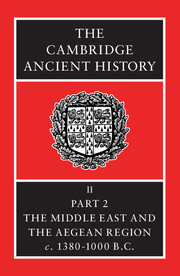Book contents
- Frontmatter
- Contents
- List of Maps
- List of Text-figures
- Preface
- CHAPTER XVII THE STRUGGLE FOR THE DOMINATION OF SYRIA (1400-1300 B.C.)
- CHAPTER XVIII ASSYRIA AND BABYLON, c. 1370-1300 B.C.
- CHAPTER XIX EGYPT: THE AMARNA PERIOD AND THE END OF THE EIGHTEENTH DYNASTY
- CHAPTER XX THE AMARNA LETTERS FROM PALESTINE
- CHAPTER XXI (a) ANATOLIA FROM SHUPPILULIUMASH TO THE EGYPTIAN WAR OF MUWATALLISH
- (b) UGARIT
- (c) TROY VII
- CHAPTER XXII (a) THE EXPANSION OF MYCENAEAN CIVILIZATION
- (b) CYPRUS IN THE LATE BRONZE AGE
- CHAPTER XXIII EGYPT: FROM THE INCEPTION OF THE NINETEENTH DYNASTY TO THE DEATH OF RAMESSES III
- CHAPTER XXIV THE HITTITES AND SYRIA (1300-1200 B.C.)
- CHAPTER XXV ASSYRIAN MILITARY POWER 1300-1200 B.C.
- CHAPTER XXVI (a) PALESTINE IN THE TIME OF THE NINETEENTH DYNASTY: THE EXODUS AND WANDERINGS
- (b) ARCHAEOLOGICAL EVIDENCE
- CHAPTER XXVII THE RECESSION OF MYCENAEAN CIVILIZATION
- CHAPTER XXVIII THE SEA PEOPLES
- CHAPTER XXIX ELAM c. 1600-1200 B.C.
- CHAPTER XXX PHRYGIA AND THE PEOPLES OF ANATOLIA IN THE IRON AGE
- CHAPTER XXXI ASSYRIA AND BABYLONIA, c. 1200-1000 B.C.
- CHAPTER XXXII ELAM AND WESTERN PERSIA, c. 1200-1000 B.C.
- CHAPTER XXXIII SYRIA, THE PHILISTINES, AND PHOENICIA
- CHAPTER XXXIV THE HEBREW KINGDOM
- CHAPTER XXXV EGYPT: FROM THE DEATH OF RAMESSES III TO THE END OF THE TWENTY-FIRST DYNASTY
- CHAPTER XXXVI THE END OF MYCENAEAN CIVILIZATION AND THE DARK AGE
- CHAPTER XXXVII THE WESTERN MEDITERRANEAN
- CHAPTER XXXVIII GREEK SETTLEMENT IN THE EASTERN AEGEAN AND ASIA MINOR
- CHAPTER XXXIX (a) THE PREHISTORY OF THE GREEK LANGUAGE
- CHAPTER XXXIX (b) THE HOMERIC POEMS AS HISTORY
- CHAPTER XL THE RELIGION AND MYTHOLOGY OF THE GREEKS
- BIBLIOGRAPHIES
- Chronological Tables
- Index to Maps
- General Index
- Map 1. Ancient Asia Minor and Northern Mesopotamia
- Map 3. Distribution of Mycenaean sites and remains in Greece and the Aegean
- Map 14. The Western Mediterranean
- References
CHAPTER XL - THE RELIGION AND MYTHOLOGY OF THE GREEKS
Published online by Cambridge University Press: 28 March 2008
- Frontmatter
- Contents
- List of Maps
- List of Text-figures
- Preface
- CHAPTER XVII THE STRUGGLE FOR THE DOMINATION OF SYRIA (1400-1300 B.C.)
- CHAPTER XVIII ASSYRIA AND BABYLON, c. 1370-1300 B.C.
- CHAPTER XIX EGYPT: THE AMARNA PERIOD AND THE END OF THE EIGHTEENTH DYNASTY
- CHAPTER XX THE AMARNA LETTERS FROM PALESTINE
- CHAPTER XXI (a) ANATOLIA FROM SHUPPILULIUMASH TO THE EGYPTIAN WAR OF MUWATALLISH
- (b) UGARIT
- (c) TROY VII
- CHAPTER XXII (a) THE EXPANSION OF MYCENAEAN CIVILIZATION
- (b) CYPRUS IN THE LATE BRONZE AGE
- CHAPTER XXIII EGYPT: FROM THE INCEPTION OF THE NINETEENTH DYNASTY TO THE DEATH OF RAMESSES III
- CHAPTER XXIV THE HITTITES AND SYRIA (1300-1200 B.C.)
- CHAPTER XXV ASSYRIAN MILITARY POWER 1300-1200 B.C.
- CHAPTER XXVI (a) PALESTINE IN THE TIME OF THE NINETEENTH DYNASTY: THE EXODUS AND WANDERINGS
- (b) ARCHAEOLOGICAL EVIDENCE
- CHAPTER XXVII THE RECESSION OF MYCENAEAN CIVILIZATION
- CHAPTER XXVIII THE SEA PEOPLES
- CHAPTER XXIX ELAM c. 1600-1200 B.C.
- CHAPTER XXX PHRYGIA AND THE PEOPLES OF ANATOLIA IN THE IRON AGE
- CHAPTER XXXI ASSYRIA AND BABYLONIA, c. 1200-1000 B.C.
- CHAPTER XXXII ELAM AND WESTERN PERSIA, c. 1200-1000 B.C.
- CHAPTER XXXIII SYRIA, THE PHILISTINES, AND PHOENICIA
- CHAPTER XXXIV THE HEBREW KINGDOM
- CHAPTER XXXV EGYPT: FROM THE DEATH OF RAMESSES III TO THE END OF THE TWENTY-FIRST DYNASTY
- CHAPTER XXXVI THE END OF MYCENAEAN CIVILIZATION AND THE DARK AGE
- CHAPTER XXXVII THE WESTERN MEDITERRANEAN
- CHAPTER XXXVIII GREEK SETTLEMENT IN THE EASTERN AEGEAN AND ASIA MINOR
- CHAPTER XXXIX (a) THE PREHISTORY OF THE GREEK LANGUAGE
- CHAPTER XXXIX (b) THE HOMERIC POEMS AS HISTORY
- CHAPTER XL THE RELIGION AND MYTHOLOGY OF THE GREEKS
- BIBLIOGRAPHIES
- Chronological Tables
- Index to Maps
- General Index
- Map 1. Ancient Asia Minor and Northern Mesopotamia
- Map 3. Distribution of Mycenaean sites and remains in Greece and the Aegean
- Map 14. The Western Mediterranean
- References
Summary
THE FORMATION OF GREEK RELIGION
There is something anomalous in writing of Greek religion down to the time of Homer. The Homeric poems are the earliest literary documents of Greece which we possess, and more fitted for a starting-point than a conclusion. Many of the characteristic features of Greek religion belong to a later age, and to discuss, for example, Athena without the background of Athenian democracy, the Parthenon and the Panathenaea may seem a curious proceeding. The limitations of this chapter make it inappropriate to begin, as would otherwise be natural in writing an account of the religion of a particular people, by noting some of its general features, the typical marks by which it is distinguished from the religions of other peoples and periods, before going on to fill in the details of the picture. We are indeed scarcely concerned with Greek religion as we ordinarily and rightly regard it, but only with an early stage in its formation. This must not of course be exaggerated. Homer represents one of the finest achievements of the distinctively Greek genius. Yet in the religion of the classical period Homer, though still a dominant influence, was only one element out of many. By dividing up Greek religion as the plan of this work demands, we are confined to a very strict interpretation of the historical method.
It is usual to start a historic account of Greek religion from the undoubted fact that the Greeks were immigrants to Greece, speaking an Indo-European tongue, who entered the peninsula and the adjacent islands in a series of waves, mainly between about 2000 and 1000 B.C.
- Type
- Chapter
- Information
- The Cambridge Ancient History , pp. 851 - 905Publisher: Cambridge University PressPrint publication year: 1975

